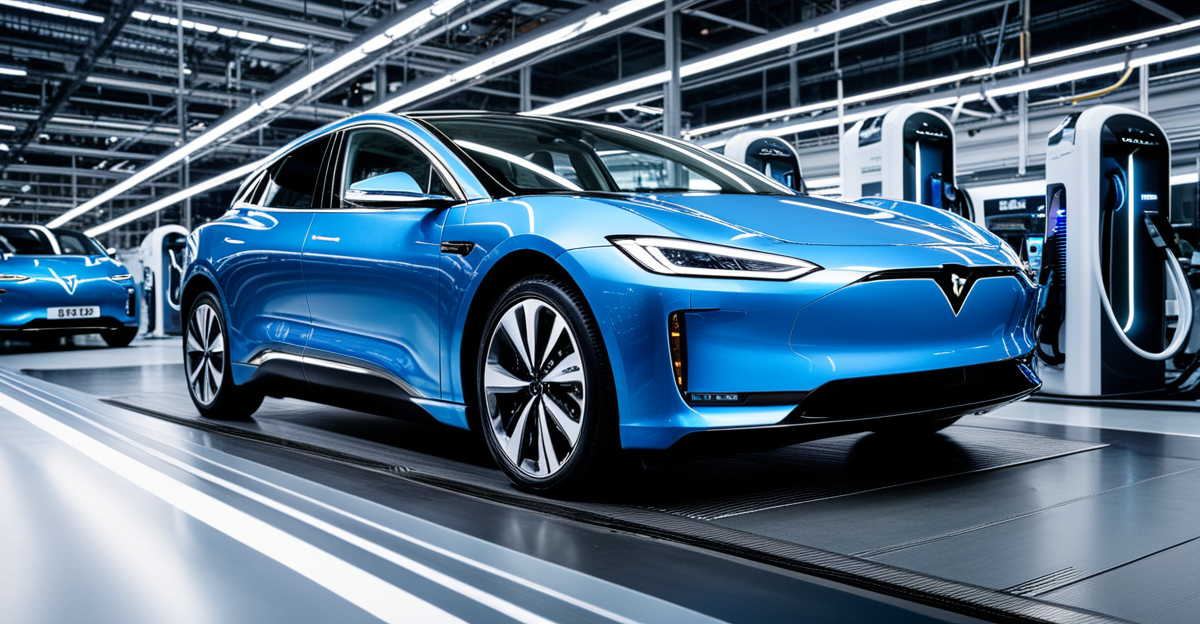Immediate Impacts of Electric Vehicle Adoption on UK Auto Manufacturing
Electric vehicle adoption in the UK is rapidly reshaping UK auto manufacturing trends. As the market shifts, there is a noticeable decline in production output of traditional internal combustion engine vehicles, supplanted by rising demand for electric vehicles (EVs). This shift challenges manufacturers to retool factories and adjust supply chains to meet new production requirements.
Current market data reveals an accelerating growth in the UK’s EV market share, driven both by consumer demand and regulatory pressure. Industry reports indicate that electric vehicles now represent a significant portion of new car sales, prompting manufacturers to prioritize EV production capabilities.
Also to see : How is the UK automotive sector enhancing vehicle cybersecurity?
In response, leading UK automakers have proactively embraced electrification trends. Major players have launched dedicated EV production lines and invested in research and development focused on battery technology and powertrains. These steps underline the EV production impact on the traditional manufacturing landscape—calling for innovation and agility amid the evolving market.
Such transitions are not merely manufacturing shifts but strategic pivots. They signify the UK automotive sector’s commitment to remaining competitive globally, adapting swiftly to the demands of a low-emission future while navigating the complexities of the ongoing energy transition.
Have you seen this : How Will Technological Advancements Shape the Future of UK Automobiles?
Workforce Transformation and Skills Development
The transition to electric vehicle adoption UK is fundamentally reshaping automotive employment UK. Traditional roles tied to internal combustion engine production are declining, while demand surges for specialized EV skills such as battery assembly, software integration, and electric powertrain engineering. This shift highlights a considerable EV skills gap within the existing workforce.
To address this, UK auto manufacturers and industry bodies have initiated widespread retraining auto industry programs. These initiatives focus on reskilling employees on electrification technologies and digital manufacturing methods. For example, leading automakers have partnered with technical colleges to develop tailored EV curricula, enabling workers to transition smoothly into EV production roles.
Such investments in workforce development are crucial for sustaining UK auto manufacturing trends. They ensure that talent pipelines keep pace with evolving production demands and the EV production impact on job functions. This adaptive approach helps mitigate risks of skill shortages while fostering innovation culture.
Overall, retraining efforts in the UK automotive employment sector empower workers, support industry growth, and maintain competitive advantage amid rapid electrification. Prioritizing skills development remains a pivotal strategy for meeting the challenges posed by electric vehicle adoption UK.
Supply Chain Evolution in the Shift to Electric Vehicles
Electric vehicle adoption UK has triggered a profound transformation of the EV supply chain UK. Unlike traditional vehicles, EVs require specialized components such as high-capacity batteries, power electronics, and electric motors, necessitating a shift in sourcing and production processes. This evolution challenges UK manufacturers to establish reliable access to raw materials and advanced components critical to EV performance and safety.
Battery manufacturing UK has become a focal point, with increased investments in local facilities to reduce dependence on overseas suppliers. Developing domestic battery production enhances supply security and supports the UK’s ambition for a robust EV ecosystem. Furthermore, UK automakers and suppliers are forming new partnerships to innovate and scale EV component manufacturing efficiently.
Sourcing EV components now prioritizes sustainability and supply resilience, aligning with broader environmental goals. Examples include sourcing ethically mined materials and adopting circular economy principles through battery recycling.
Adapting the EV supply chain UK enables the automotive sector to respond rapidly to the growing market, ensuring components meet quality and technological standards. This supply chain transformation is integral to sustaining UK auto manufacturing trends and securing the nation’s competitive position in the global electric vehicle industry.
Challenges and Opportunities for UK Auto Manufacturers
Electric vehicle adoption UK presents significant challenges for UK automakers as well as notable opportunities. Key challenges include the high costs of retooling production lines and complying with stringent UK automotive industry future regulations targeting emissions reduction. Infrastructure limitations, such as charging networks, also impact market growth and require coordinated government and private sector efforts.
Despite these hurdles, emerging opportunities in EV manufacturing are substantial. Innovations in battery technology and powertrain design open new avenues for differentiation and efficiency. UK automakers are exploring new business models for EVs, including vehicle-as-a-service platforms and software integration, to capture value beyond traditional sales.
Strategies from leading manufacturers emphasize agility and investment in R&D to stay globally competitive. For example, partnerships with technology firms foster rapid innovation and enhance supply chain resilience. This proactive approach prepares the sector to navigate challenges for UK automakers while capitalizing on the growing EV market domestically and internationally.
Overall, the UK automotive industry future depends on balancing immediate investments against long-term market trends. Successfully managing these dynamics will secure the nation’s role in the evolving global electric vehicle landscape.
Immediate Impacts of Electric Vehicle Adoption on UK Auto Manufacturing
Electric vehicle adoption UK is rapidly altering UK auto manufacturing trends, particularly in production outputs. Traditional internal combustion engine vehicles are seeing a consistent decline, while EV manufacturing surges to meet growing consumer and regulatory demand. The current UK EV market share reflects this shift, with electric vehicles comprising an increasing percentage of new car sales annually.
This acceleration compels manufacturers to reorganize factory operations and supply chains, embedding EV-specific technologies and processes. The EV production impact extends beyond volume changes—it demands new expertise in battery integration, electric motors, and power electronics, altering production workflows significantly.
Major UK automakers have responded swiftly. Leading manufacturers are investing heavily in dedicated EV production lines, highlighting a strategic focus on electrification. These efforts include scaling research in battery efficiency and electric powertrain innovation to maintain competitiveness. In essence, electric vehicle adoption UK is a catalyst prompting the entire auto manufacturing sector to pivot toward sustainable, technology-driven production, reflecting broader market and regulatory transformations.
Immediate Impacts of Electric Vehicle Adoption on UK Auto Manufacturing
Electric vehicle adoption UK is causing a rapid restructuring of UK auto manufacturing trends. Production output for traditional internal combustion engine vehicles is sharply decreasing, while EV manufacturing surges to meet growing demand. This shift reflects a decisive EV production impact, requiring factories to incorporate new systems for batteries, electric motors, and power electronics.
Current market data reveals electric vehicles now account for a significant and rising share of UK new car sales, demonstrating accelerating consumer acceptance and regulatory influence. Consequently, manufacturers face the dual challenge of scaling EV production capacity while managing legacy vehicle lines during the transition.
Major UK automakers have swiftly responded by investing in dedicated EV production lines and expanding research on battery technology and electric powertrains. This includes retooling plant operations and retraining personnel to handle nuanced assembly processes unique to electric vehicles.
The transformation is not limited to volume changes; it also signifies a fundamental shift in manufacturing expertise and operational workflows. The EV production impact underscores the sector’s evolution towards sustainable practices and advanced technology, reflecting broader shifts in the global automotive landscape.
Immediate Impacts of Electric Vehicle Adoption on UK Auto Manufacturing
Electric vehicle adoption UK has decisively altered UK auto manufacturing trends, with a stark shift from internal combustion engines to EVs. Production output for traditional vehicles has decreased as manufacturers respond to surging demand for electric vehicles. Current UK market data confirms a rapid increase in EV market share, reflecting growing consumer preference and regulatory mandates driving electrification.
The EV production impact extends beyond volume changes; it requires extensive retooling of assembly lines and integration of new technologies like battery packs, electric motors, and sophisticated power electronics. This transformation demands expertise in novel manufacturing processes, altering workflows and skill requirements significantly.
Major UK automakers have reacted by launching dedicated EV production lines and investing heavily in battery and powertrain R&D. These early responses underscore a strategic pivot toward electrification to maintain global competitiveness. This shift also positions UK manufacturing within a broader technological transition, enhancing innovation capacity and sustainability focus. As the UK continues accelerating EV adoption, the auto industry faces ongoing pressures to adapt operations swiftly while balancing legacy production challenges.










